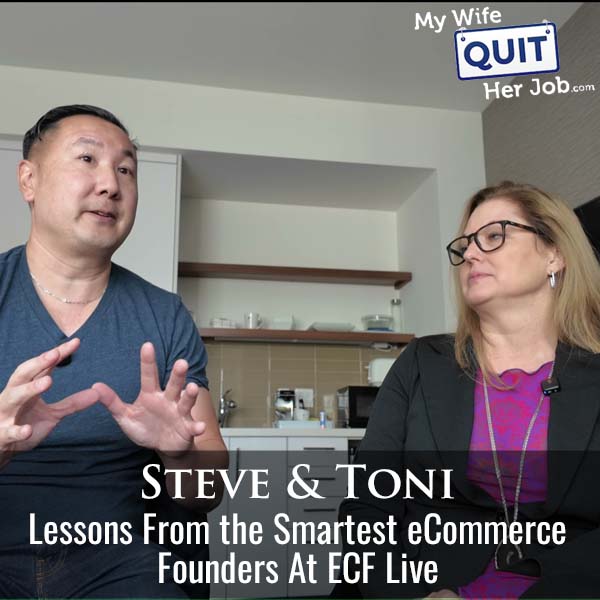612: Lessons From the Smartest eCommerce Founders At ECF Live

E-commerce Experts Share Insights on Automation and Inventory Forecasting at ECF Live
Bozeman, MT – Steve Chou and his wife Toni, of MyWifeQuitHerJob.com, recently attended Ecommerce Fuel Live (ECF Live) in Bozeman, Montana, where they gathered actionable insights from leading e-commerce entrepreneurs. A key focus of the event was leveraging automation and AI to streamline business processes, particularly in areas like customer relationship management and inventory forecasting.
Key Takeaways from ECF Live: Automation and AI Dominate Discussions
The Chous emphasized two major takeaways from the conference: the immediate need to implement AI-powered automations for repetitive tasks and the potential for AI-driven inventory forecasting to improve efficiency and reduce costs. These topics resonated strongly with other attendees, highlighting the growing importance of these technologies in the e-commerce landscape.
Automating Customer Outreach for High-Value Orders
Toni Chou highlighted the inefficiencies of manually identifying and contacting customers who place large orders. "When someone spends $800 on our low-priced products, they're likely a group or organization," she explained. "We want to personalize their experience, but manually checking orders and sending individual Slack notifications is time-consuming." The solution discussed involved automating notifications to customer service representatives when orders exceed a certain value, triggering personalized outreach through email or phone calls. This ensures high-value customers receive tailored attention, fostering stronger relationships and potentially driving repeat business.
AI-Powered Inventory Forecasting: A Cost-Effective Alternative
Inventory management remains a significant challenge for many e-commerce businesses. The Chous discussed the potential of using AI to improve inventory forecasting, noting that many existing SaaS solutions are expensive and offer features that businesses don't fully utilize. They suggested exploring alternative approaches using AI tools in conjunction with platforms like N8n or Make.com to create customized, cost-effective forecasting solutions. This allows businesses to leverage the power of AI without incurring the high costs associated with comprehensive, pre-built software packages.
Expert Perspective: The Rise of AI in E-commerce Operations
Dr. Anya Sharma, a professor of e-commerce and digital marketing at the University of California, Berkeley, notes that the trends discussed at ECF Live reflect a broader shift in the industry. "E-commerce businesses are increasingly recognizing the value of AI in automating tasks, personalizing customer experiences, and optimizing operations," Sharma explains. "The key is to identify specific pain points and develop targeted AI solutions that address those needs, rather than investing in expensive, all-in-one platforms." Sharma cautions against over-reliance on AI, emphasizing the importance of human oversight and ethical considerations in its implementation.
N8n and Make.com: Democratizing Automation for E-commerce
The discussion of N8n and Make.com as alternatives to Zapier highlights the growing trend of accessible automation tools. N8n, a free, open-source platform, requires self-hosting but offers unlimited operations. Make.com, a paid service, provides a user-friendly interface and cost-effective pricing for lower-volume automation needs. These platforms empower e-commerce businesses to connect various software applications and automate workflows without extensive technical expertise.
Historical Context: The Evolution of E-commerce Automation
The shift towards AI-powered automation in e-commerce is a natural progression from earlier stages of automation. In the early days of e-commerce, businesses focused on automating basic tasks like order processing and email marketing. As technology advanced, more sophisticated automation tools emerged, enabling businesses to personalize customer experiences and optimize pricing strategies. The current wave of AI-driven automation represents a significant leap forward, allowing businesses to automate complex tasks like inventory forecasting and customer segmentation with greater accuracy and efficiency.
Current Context: The Evolving E-commerce Landscape
The e-commerce landscape is becoming increasingly competitive, with businesses facing pressure to reduce costs, improve efficiency, and enhance customer experiences. AI-powered automation offers a powerful tool for achieving these goals. By automating repetitive tasks, businesses can free up employees to focus on higher-value activities like product development, marketing, and customer service. Furthermore, AI can help businesses personalize customer experiences, leading to increased customer loyalty and sales.
Looking Ahead: The Future of Automation in E-commerce
As AI technology continues to evolve, its role in e-commerce will likely expand further. Businesses can expect to see more sophisticated AI-powered tools for tasks like fraud detection, supply chain optimization, and predictive analytics. However, it's crucial for businesses to approach AI implementation strategically, focusing on areas where it can deliver the greatest value and ensuring that it complements, rather than replaces, human expertise.
Alternative Perspectives: Outsourcing Development to Latin America
Steve Chou noted a growing trend among ECF Live attendees of hiring developers in Latin America as a cost-effective alternative to US-based developers. This allows e-commerce businesses to access skilled talent at lower rates, enabling them to develop custom solutions and integrations without breaking the bank. This practice underscores the global nature of e-commerce and the increasing accessibility of talent across borders.
Originally sourced from: WifeQuitHer Job
